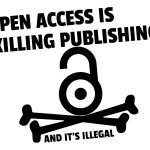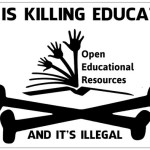I am frequently surprised by how many people do not understand copyright, fair use, and public domain. This lack of understanding is not good; among other things, it means that those who do understand copyright (i.e., those who can afford to pay scads of lawyers to understand it for them) can drive legislation, policies, and court decisions favorable to their interests. By and large, regular consumers and independent/small producers are at a disadvantage.
In terms of copyright, the Web is a very curious place. It is at once awash in copyright violations and over-stringent in knocking down content pretty clearly protected by fair use. In the first instance, a lot of people just do not especially care — I take a nice photo or jot down a great joke or epigram; my friend posts it to social media; it gets copied and re-copied. I may not care because I never intended to monetize it or assert my intellectual property rights; I am just happy to see my work proliferate. Had I thought about it, I might have used a Creative Commons license or similar. In the second instance, big content creators, owners of lots and lots of valuable IP, see the Web and the Internet more generally as a battlefield. Their interests lie in licensing, in click-wrap, in DRM, and in eroding or obscuring fair use rights. Read Terms of Use and licensing agreements. Often they explicitly prohibit uses that would almost certainly be protected under law. Challenges to this kind of behavior could end up in a court, which inherently favors those who can spend time and money on lawyers — and without even risking emotional/health consequences.
Frankly, if my job did not involve licensing and IP, I might not know or care much about copyright…so I do sympathize with those in the dark. Still, how frequent is my surprise! In a recent Ars Technica article, What Would Twitter Do? Musician’s tweets of Sony e-mails lead to threats, which involves a musician in some hot water for tweeting images of stolen/leaked Sony property, the following jumped right out at me:
“To me, it’s public domain,” said Broeksmit. “I don’t see it as stolen property. I mean, maybe at one point it was. I don’t know what the line is. I figure, other people are doing it — I didn’t see the harm in it.”
One comment on the article replies, “People really need to learn what public domain is.”
Note that the person quoted in the article is a musician, whose livelihood probably depends heavily on the creation, monetization, and protection of intellectual property. When he says “public domain”, he probably truly means “fair use”; when he means “fair use”, he probably truly means “fair play” — that is, while legally shady, releasing these documents is morally square. We have to stick it to big corporations, right? Right? At least, that is what I read into a statement that is otherwise fairly nonsensical.
What bothers me particularly, over and above the very careless use of a concept (public domain) that is very important to me, is the statement “I don’t know what the line is.” With this wonderful, beautiful, fragile Web we have built, information on where the line is can be found within minutes. Fully understanding all this stuff is quite difficult, but getting the basics right before thoughtlessly firing off tweet after tweet is not. A web search for “define public domain”, “define fair use”, or “define copyright” is a great place to begin. Of course, anyone with the stomach to trawl through 1,288 pages of “copyright practices” — all in PDF format only, woohoo! — can just go here:
Compendium of U.S. Copyright Office Practices, Third Edition.
There is a lot that Sony and I would probably disagree about in any copyright/fair-use conversation, but I think we are on the same page here — stolen correspondence that has been dumped on the Web is about as far from public domain as it gets. When people do not understand this and abuse terminology in defense of arguably immoral and probably illegal behavior, limitations on copyright terms, protections for fair use, and expansion of the public domain potentially suffer.





